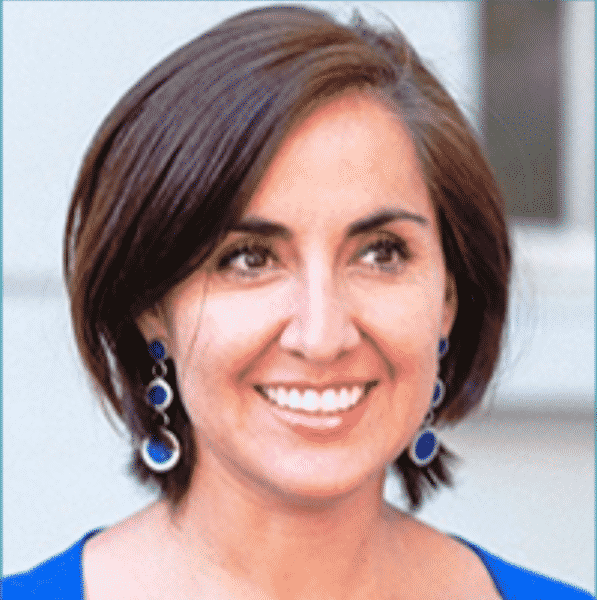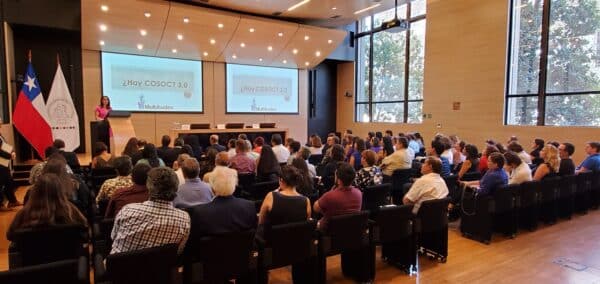Please present yourself
My name is Paulina Ibarra. I am the Executive Director of Fundación Multitudes and the first elected Chairwoman of the Civil Society Pillar of the Community of Democracies. I have global experience in the areas of transparency, citizen participation, and accountability and have worked in government, the private sector, and international organizations.

Fundación Multitudes is a non-governmental, women-led organization based in Chile. We seek the creation of a just and inclusive society by promoting civil society participation in policy and decision-making processes.
What motivates you/inspires you to work in anti-corruption?
As corruption reduces the resources available to invest in social projects, fighting and preventing this phenomenon is crucial for social development, the protection of human rights, and overcoming poverty. Therefore, I am eager to work towards building a more open state and to promote transparent institutions and accountability with a strong emphasis on collaboration between citizens and government, so as to contribute to an informed and participatory citizenry.
What are your organization’s main goals?
Fundación Multitudes has three main objectives:
- To strengthen equal participation in public policymaking in the areas of social development, human rights protection, and poverty reduction.
- To bring citizens closer to public institutions and to provide them with tools for effective advocacy and accountability, thus expanding the space for citizen participation in decision-making processes.
- To work on the creation of information and feedback management mechanisms based on informed citizen participation, where public bodies, in consideration of the interests of civil society, can optimize their decision-making processes.
How does your organization operate?
In Fundación Multitudes we follow a horizontal scheme between three main bodies: The Directory Board, the Advisory Board, and the work team, which are primarily composed of women. The work team is led by the Executive Director, the Advocacy Director, and the Research Director, respectively, and is based on the permanent work of interns and volunteers. We work at the national and international level and participate and advocate in multiple coalitions that seek to strengthen the role of civil society.
We count on the support of different organizations that collaborate with the financing of our organization in order to fulfill our work and continue working to close the gap between citizens and decision-makers. These organizations include Open Society Foundations, Open Contracting Partnership, the Latin American and Caribbean Network for Democracy, the Inter-American Development Bank, and many more.
What are the biggest successes your organization has accomplished in the field of anti-corruption in the past years?
The following are some of our biggest successes in the field of anti-corruption:
- Integral Support to Municipalities to develop an Open Government Action Plan:
We are providing technical assistance to municipalities led by female mayors for the implementation of an Open Government Action Plan that is sustainable and adequate to the demands of their territories, applying the collaborative governance tools of Open Government. We have already met with several mayors and their teams, and achieved positive initial outcomes: mayors were able to identify challenges in their communities, and they were open to collaborating with civil society to create a more open local government. - Is there COSOC? – A Radiography of the Municipal Civil Society Councils (COSOCs):
This is a study carried out since 2015 to determine the status of COSOCs at the municipal level. Through the publication of this report for the past 7 years, we have achieved progress in an analysis of influential variables and thus helped in compliance with Law 20.500 by the local governments in Chile.

Event to present our project ‘Is there COSOC?’
- Leadership Training:
This permanent program, self-managed and financed by Fundación Multitudes, seeks to train members of civil society organizations to influence public policies and interact with authorities. We have trained more than 1600 leaders interested in democracy on issues of citizen participation, lobbying, and transparency. As a result of this initiative, the Municipal Civil Society Council was installed in the commune of Isla de Maipo. - Lobby Law Platform:
To monitor compliance with equal treatment in the Lobby Law, we created a web platform with data from the Infolobby platform. For this, a search engine was developed for users to look for the subject for which they have requested an audience and see how many people and with which taxable person they have been linked to.
What are the key challenges specific to your local context that your organization has been facing?
Financial constraints have endangered the anti-corruption work of Fundación Multitudes in Chile and the wider region. The aversion of governments to cooperate with civil society to develop tools to fight corruption has been another challenge in this regard. Moreover, there is a lack of information that people can access to properly engage with anti-corruption initiatives, mechanisms, and resources that governments, civil society organizations, international coalitions, and other actors have developed.
What can other organizations learn from you?
Research is our best ally to combat corruption, especially in Latin America. As we face a permanent lack of data and information on governance and allocation of resources, the role of civil society organizations is key to present and expose the reality to the general public. Based on this evidence, citizens will engage in the fight against corruption, as they will get in-depth knowledge to carry out accountability processes that will undermine the impact and intensity of the phenomenon.
Likewise, it is important to invest in alliances. To hold governments accountable, joint efforts are necessary, as each actor has something to share to make the initiatives much more complete and effective.
Why is it important for you to be part of the UNCAC Coalition?
I believe that the relationship between the UNCAC Coalition and Fundación Multitudes could be symbiotic given our aligned interests, missions, and projects. Becoming a civil society partner of the UNCAC Coalition would allow Multitudes to strengthen its own national and regional efforts to fight corruption.
Above all, Multitudes is a civil society organization that promotes the democratic value of open, inclusive, and transparent governance. This value clashes directly with the widespread corruption and lack of transparency in several decision-making processes in Chile. I truly believe that the UNCAC Coalition can support our organization’s work by collaborating on anti-corruption research and advocacy efforts in the Latin American region.




